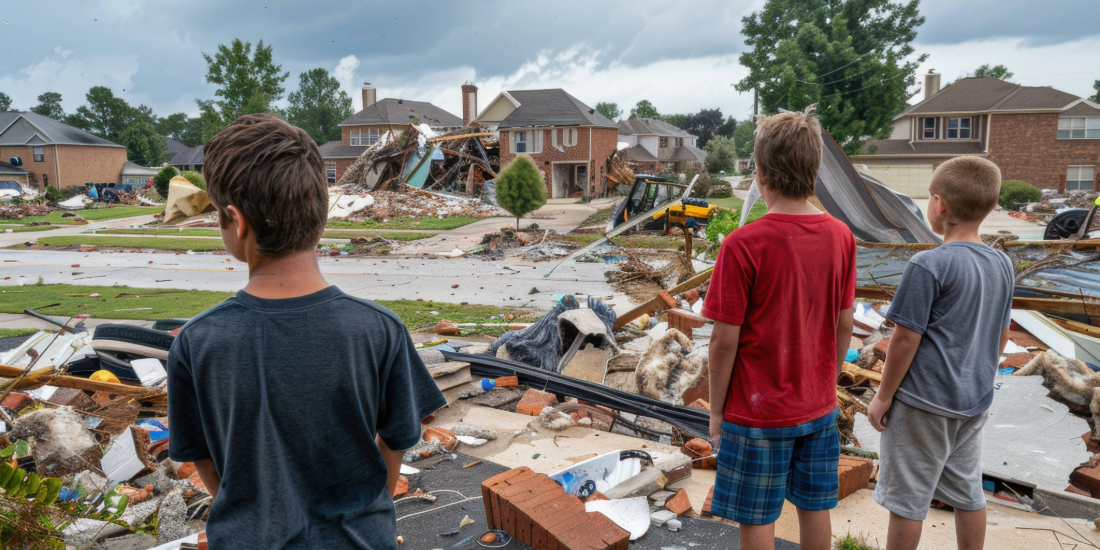Most recently published

Debris Monitors – Cleaning Up and Clearing Out
Kirby McCrary
September 5, 2007
The crisis is not really “over” until the paperwork has been completed – in full, on time, and frequently in triplicate. In the field of debris removal adherence to that old saying is sometimes the difference between bankruptcy and prosperity.

James Lee Witt, CEO, James Lee Witt Associates
John F. Morton and James Lee Witt
September 5, 2007
The former FEMA administrator discusses the agency’s reorganization process, the proposed establishment of a national catastrophic-insurance fund, FEMA’s working relationship with the ARC, and the rationale for upgrading the agency to cabinet-level.

Systems and Solutions – The Gateways to Interoperability
Gary Simpson
August 22, 2007
The terrorist attacks of September 11, 2001, brought to light, in stark reality, one of the greatest problems facing public safety entities around the world – communications interoperability. Since 9/11 many jurisdictions have spent millions of dollars to upgrade communications systems with features that are designed to improve their ability

Judith Miller, Author & Journalist
John F. Morton and Judith Miller
August 15, 2007
The Pulitzer Prize winner’s knowledgeable appraisal of how two of the nation’s largest metropolitan police departments – in New York City and Los Angeles – are coping with the unique and steadily growing threats posed by international terrorism.

The Doctors Plot – Its Implications for America
David P. Wright
August 15, 2007
Security experts dismiss the attempt by Islamic doctors to blow up a London nightclub as an “amateurish” operation. But that misses the real point, which is that physicians – people who know how to make biological weapons – are now on the terrorist team.

Area Maritime Security Committees – A Unified Effort for Securing U.S. Ports
Christopher Doane and Joseph DiRenzo III
August 8, 2007
The Coast Guard’s Captains of the Port have the primary responsibility for developing effective port-security plans for their jurisdictions, but it has to be an all-hands effort or there will be, in nautical terms, a bitter end.

The Next Wave of Synergy in Port/Maritime Security
Joseph DiRenzo III and Christopher Doane
August 3, 2007
Synergy, fusion, jointness, unity of effort – all are important characteristics to the success of the multi-agency operations needed to ensure the security of ports in the United States – but those laudable characteristics also are difficult to achieve, particularly when a broad spectrum of agencies control their forces from

Sheltering Against the Ultimate – A Nuclear Detonation in a U.S. City
Kirk Paradise
August 1, 2007
The good news is that the fallout shelters built during the Cold War never had to be used. The bad news is that they might have to be resurrected, refurbished and reconditioned, and made available as “just in case” protection facilities.

Hospital Evacuations: Planning, Exercises, and Common Sense
Joseph Cahill
August 1, 2007
“Full-scale” exercises sound like, and are, the ideal – but only in certain almost-perfect circumstances, and not without a firm foundation of individual and team training exercises to build on.

Debris Removal – How to Avoid Jurisdictional Disputes
Kirby McCrary
July 25, 2007
Several companies, each with a valid contract to clear debris from the same road. Who wins? Not the taxpayer, certainly. Advance planning can solve the problem, and a few federally funded programs will also help.

AIHA’s Mock Meth Lab Highlights Health and Safety Risks
Heather McArthur
July 18, 2007
Science may be wonderful, but it is also extremely lethal, particularly when used to manufacture illegal drugs. The clandestine meth labs set up in cities throughout the United States are prime examples of disasters waiting to happen.

Emergency Medical Services at a Mass Casualty Incident
Joseph Cahill
July 11, 2007
Standard operating procedures are by definition not enough when EMS responders are called to the scene of a mass-casualty incident. Extraordinary and/or non-standard procedures are not only permitted, therefore, but frequently mandatory.

Rear Admiral David P. Pekoske, USCG, and Rear Admiral Brian M. Salerno, USCG
John F. Morton, David P. Pekoske and Brian M. Salerno
September 11, 2007
Their views on current and future maritime-security operations, the USCG’s relationships with other agencies, new security standards being considered, and the service’s interface with the Navy, CBP, and various port stakeholders.

Debris Monitors – Cleaning Up and Clearing Out
Kirby McCrary
September 5, 2007
The crisis is not really “over” until the paperwork has been completed – in full, on time, and frequently in triplicate. In the field of debris removal adherence to that old saying is sometimes the difference between bankruptcy and prosperity.

James Lee Witt, CEO, James Lee Witt Associates
John F. Morton and James Lee Witt
September 5, 2007
The former FEMA administrator discusses the agency’s reorganization process, the proposed establishment of a national catastrophic-insurance fund, FEMA’s working relationship with the ARC, and the rationale for upgrading the agency to cabinet-level.

Systems and Solutions – The Gateways to Interoperability
Gary Simpson
August 22, 2007
The terrorist attacks of September 11, 2001, brought to light, in stark reality, one of the greatest problems facing public safety entities around the world – communications interoperability. Since 9/11 many jurisdictions have spent millions of dollars to upgrade communications systems with features that are designed to improve their ability

Judith Miller, Author & Journalist
John F. Morton and Judith Miller
August 15, 2007
The Pulitzer Prize winner’s knowledgeable appraisal of how two of the nation’s largest metropolitan police departments – in New York City and Los Angeles – are coping with the unique and steadily growing threats posed by international terrorism.

The Doctors Plot – Its Implications for America
David P. Wright
August 15, 2007
Security experts dismiss the attempt by Islamic doctors to blow up a London nightclub as an “amateurish” operation. But that misses the real point, which is that physicians – people who know how to make biological weapons – are now on the terrorist team.

Area Maritime Security Committees – A Unified Effort for Securing U.S. Ports
Christopher Doane and Joseph DiRenzo III
August 8, 2007
The Coast Guard’s Captains of the Port have the primary responsibility for developing effective port-security plans for their jurisdictions, but it has to be an all-hands effort or there will be, in nautical terms, a bitter end.

The Next Wave of Synergy in Port/Maritime Security
Joseph DiRenzo III and Christopher Doane
August 3, 2007
Synergy, fusion, jointness, unity of effort – all are important characteristics to the success of the multi-agency operations needed to ensure the security of ports in the United States – but those laudable characteristics also are difficult to achieve, particularly when a broad spectrum of agencies control their forces from

Sheltering Against the Ultimate – A Nuclear Detonation in a U.S. City
Kirk Paradise
August 1, 2007
The good news is that the fallout shelters built during the Cold War never had to be used. The bad news is that they might have to be resurrected, refurbished and reconditioned, and made available as “just in case” protection facilities.

Hospital Evacuations: Planning, Exercises, and Common Sense
Joseph Cahill
August 1, 2007
“Full-scale” exercises sound like, and are, the ideal – but only in certain almost-perfect circumstances, and not without a firm foundation of individual and team training exercises to build on.

Debris Removal – How to Avoid Jurisdictional Disputes
Kirby McCrary
July 25, 2007
Several companies, each with a valid contract to clear debris from the same road. Who wins? Not the taxpayer, certainly. Advance planning can solve the problem, and a few federally funded programs will also help.

AIHA’s Mock Meth Lab Highlights Health and Safety Risks
Heather McArthur
July 18, 2007
Science may be wonderful, but it is also extremely lethal, particularly when used to manufacture illegal drugs. The clandestine meth labs set up in cities throughout the United States are prime examples of disasters waiting to happen.
Mid-Atlantic States Brainstorm Planning for Public Safety Interoperable Communications (PSIC) GrantSubmissions
John F. Morton
June 20, 2007
Federal officials provide insight to mid-Atlantic states as they finalize statewide plans for PSIC grant submissions. Seven states & the District of Columbia share how they are implementing interoperable communications.
ASTM-E 2458: A Mandatory Sample of Common Sense
Jason Pastuch
June 13, 2007
HazMat and EMS technicians across the nation will be working from the same text, thanks to new biological-sampling techniques developed by the American Society for Testing and Materials.
Hampton University and ERVE: Academia Learns a Tragic Lesson
Teresa Walker
June 13, 2007
Even as the nation’s colleges and universities were still mourning the tragic loss of life at Virginia Tech, one school was taking the steps needed to make its own faculty and students safer and more secure.
Citizen-Participation Drills: Beyond Duck and Cover
Joseph Cahill
June 6, 2007
With fire-prevention programs serving as an example, there is much that “everyday citizens” can learn about protecting themselves and their families in a variety of emergency situations. The most important lesson is learning one’s own limitations.
The Homeland-Security Advantages of Telework
Tom Davis
May 23, 2007
One of the nation’s most highly respected Congressional leaders points out that “the Telework Option” for federal employees is not just another employee “perk” but an easy way to cut commuting costs and, just maybe, save hundreds or thousands of lives.
Expanding the Quarantine System at the Nation’s Borders
Mathew Thomas
May 16, 2007
The need for quarantine stations at U.S. borders was on the decline – until SARS & bioterrorism created a need for more stations on a continuing basis. Dulles International Airport (first one), has achieved much success & is a template for future use.
John F. Clark, Director, U.S. Marshals Service
John F. Morton and John Clark
May 16, 2007
Clark’s views on the security improvements already achieved, and the areas in which a greater effort is needed. Also discussed: The USMS’s Special Operations and Technical Operations Groups, and the support provided to state and local L-E agencies.
Resources in Waiting: EMS Task Forces
Joseph Cahill
May 8, 2007
“Just in Case” has been trumped by “Just in Time.” One result is that there is no surge capability that emergency managers can call on in times of major incidents. Unless, of course, an EMS Task Force is waiting in the wings.
Port Security Exercises and Training: A Formidable Curriculum
Joseph DiRenzo III and Christopher Doane
May 2, 2007
As explained on the U.S. Transportation Security Agency’s website, PortSTEP (the Port Security Training and Exercise Program) was established as a partnership with the U.S. Coast Guard to improve “the intermodal transportation industry’s ability to prepare for and contend with a Transportation Security Incident.” The program is in that context
The Well-Planned Use of Citizen Volunteers
Joseph Cahill
May 2, 2007
Many first-responder agencies routinely use “4×4 volunteers” to help out in hazardous-weather situations and other emergencies. This solution to community problems must be handled with care and requires careful planning by state/local decision makers.
APHL Position Statement: Field Testing Kits, Devices Must Be Validated
Chris Mangal
April 25, 2007
The Association of Public Health Laboratories says, without proper validation, field tests of suspected biological and/or chemical agents might yield either false positives or, worse, false negatives & therefore would be, “dangerously misleading.”
Question – Is Anthrax Present, Too Long to Wait for an Answer
Kate Rosenblatt
April 25, 2007
Homeland-security experts believe the worst-case scenario for future terrorist attacks will involve biological-warfare agents such as anthrax rather than nuclear weapons. Which is why the numerous delays in the anti-anthrax program have aroused concern.
Follow Us
Get Instant Access
Subscribe today to Domestic Preparedness and get real-world insights for safer communities.


